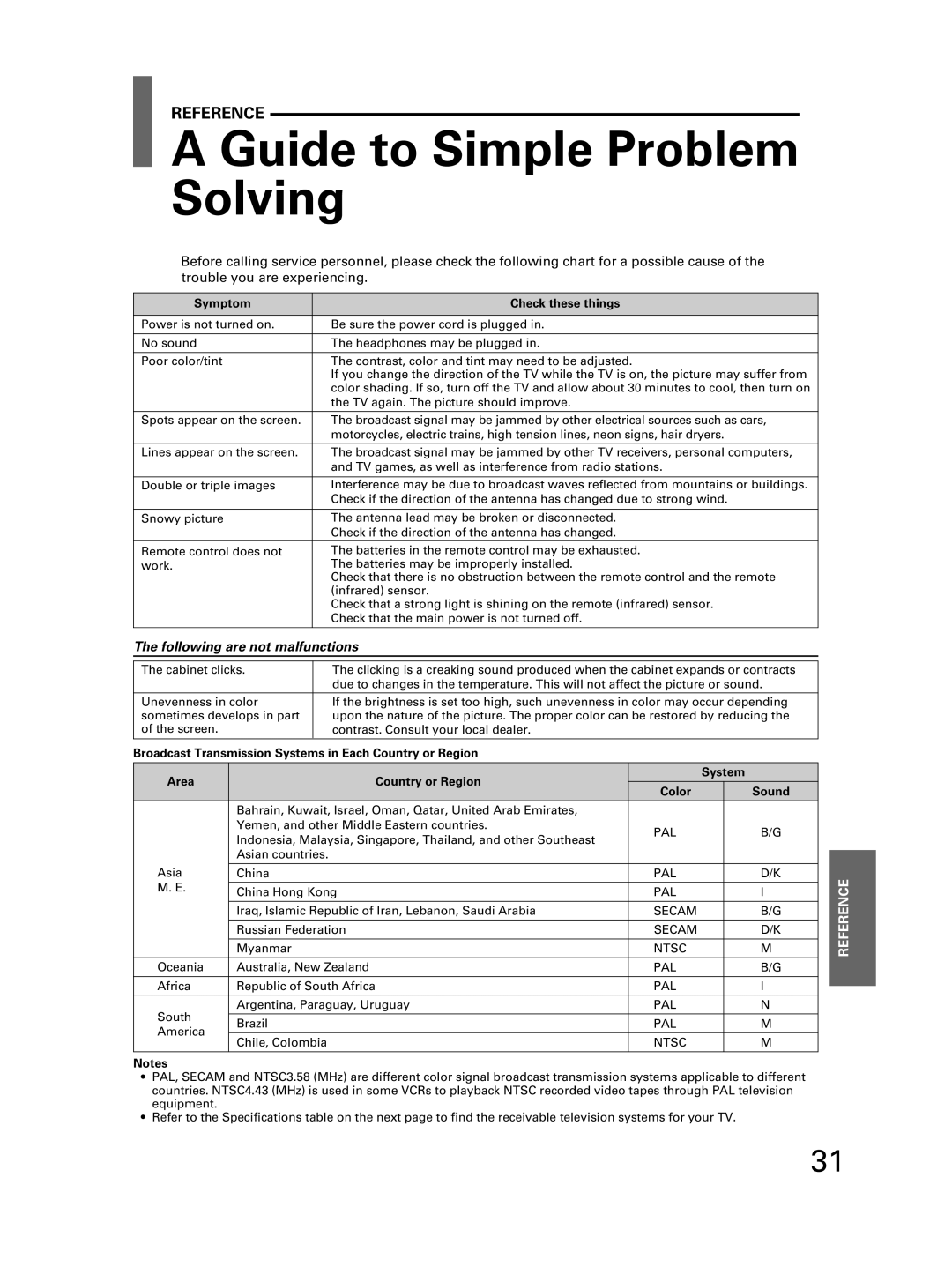
REFERENCE
A Guide to Simple Problem Solving
•Before calling service personnel, please check the following chart for a possible cause of the trouble you are experiencing.
Symptom | Check these things |
|
|
Power is not turned on. | • Be sure the power cord is plugged in. |
|
|
No sound | • The headphones may be plugged in. |
|
|
Poor color/tint | • The contrast, color and tint may need to be adjusted. |
| • If you change the direction of the TV while the TV is on, the picture may suffer from |
| color shading. If so, turn off the TV and allow about 30 minutes to cool, then turn on |
| the TV again. The picture should improve. |
|
|
Spots appear on the screen. | • The broadcast signal may be jammed by other electrical sources such as cars, |
| motorcycles, electric trains, high tension lines, neon signs, hair dryers. |
Lines appear on the screen. | • The broadcast signal may be jammed by other TV receivers, personal computers, |
| and TV games, as well as interference from radio stations. |
|
|
Double or triple images | • Interference may be due to broadcast waves reflected from mountains or buildings. |
| • Check if the direction of the antenna has changed due to strong wind. |
|
|
Snowy picture | • The antenna lead may be broken or disconnected. |
| • Check if the direction of the antenna has changed. |
Remote control does not | • The batteries in the remote control may be exhausted. |
work. | • The batteries may be improperly installed. |
| • Check that there is no obstruction between the remote control and the remote |
| (infrared) sensor. |
| • Check that a strong light is shining on the remote (infrared) sensor. |
| • Check that the main power is not turned off. |
|
|
The following are not malfunctions
The cabinet clicks. | • | The clicking is a creaking sound produced when the cabinet expands or contracts |
|
| due to changes in the temperature. This will not affect the picture or sound. |
Unevenness in color | • | If the brightness is set too high, such unevenness in color may occur depending |
sometimes develops in part |
| upon the nature of the picture. The proper color can be restored by reducing the |
of the screen. |
| contrast. Consult your local dealer. |
Broadcast Transmission Systems in Each Country or Region
Area | Country or Region |
| System | |
Color |
| Sound | ||
|
|
| ||
| Bahrain, Kuwait, Israel, Oman, Qatar, United Arab Emirates, |
|
|
|
| Yemen, and other Middle Eastern countries. | PAL |
| B/G |
| Indonesia, Malaysia, Singapore, Thailand, and other Southeast |
| ||
|
|
|
| |
| Asian countries. |
|
|
|
Asia |
|
|
|
|
China | PAL |
| D/K | |
M. E. |
|
|
|
|
China Hong Kong | PAL |
| I | |
|
| |||
|
|
|
|
|
| Iraq, Islamic Republic of Iran, Lebanon, Saudi Arabia | SECAM |
| B/G |
|
|
|
|
|
| Russian Federation | SECAM |
| D/K |
|
|
|
|
|
| Myanmar | NTSC |
| M |
|
|
|
|
|
Oceania | Australia, New Zealand | PAL |
| B/G |
|
|
|
|
|
Africa | Republic of South Africa | PAL |
| I |
South | Argentina, Paraguay, Uruguay | PAL |
| N |
|
|
|
| |
Brazil | PAL |
| M | |
America |
| |||
|
|
|
| |
Chile, Colombia | NTSC |
| M | |
|
| |||
|
|
|
|
|
Notes
•PAL, SECAM and NTSC3.58 (MHz) are different color signal broadcast transmission systems applicable to different countries. NTSC4.43 (MHz) is used in some VCRs to playback NTSC recorded video tapes through PAL television equipment.
•Refer to the Specifications table on the next page to find the receivable television systems for your TV.
FEATURES
USING THE TV'S GETTING STARTED INTRODUCTION
VIEWING | TELETEXT |
|
|
EQUIPMENT | CONNECTIONS |
|
|
REFERENCE
31
